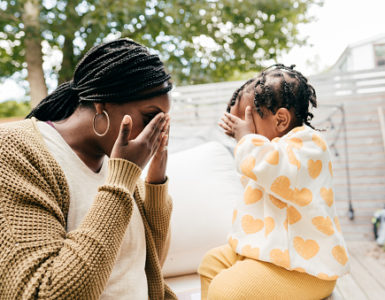
Many people unfamiliar with modern open adoption have a lot of misconceptions about how it actually works. Open adoption is not co-parenting or “sharing” a child, and the birth parents do not have the right to “take back” the child once the adoption is finalized. Quite simply, open adoption is having a relationship with your child’s birth parents and your child knowing who his or her birth parents are. Much like with any other relationship with family or close friends, this relationship looks different for everyone and may change throughout the course of the child’s life.
One of the most common misconceptions about open adoption is that it will “confuse” children, and they “won’t know who their parents are.” This thought, to me, is somewhat insulting in that it grossly underestimates what children are capable of understanding. This also plays into the commonly held belief of adoptees having “real” parents, which renders one set of parents invisible. Even toddler adoptees are capable of understanding that, before they were born, they grew inside someone else other than their adoptive mother. If you have kids, you know they start asking at a younger age than you’d expect to explain where babies come from. As they see friends and family members have pregnancies and new babies, adoptees can begin to patch together that their story is a little different. While adoptees often have questions about their adoption story or about their birth family, they are only “confused” if they are kept in the dark about their adoptee status or if information about their birth family is withheld from them. There are innumerable research studies that show that open adoption in fact creates less confusion and trauma for the adoptee and helps him or her develop a better sense of self. Adoptees have no confusion about what each parent’s role is in their life. Having a relationship with their birth family will not make their connection with their adoptive parents, the people who have done the day in and day out job of parenting them, any less strong and meaningful. Just like children are capable of loving grandparents, stepparents, aunts and uncles, they can love their birth family without somehow loving their adoptive parents less as a result.
So, practically speaking, how does open adoption work? In most cases with domestic infant adoption, the adoption agency or lawyer will assist the birth and adoptive family in creating an open adoption contact agreement. This is a document that states how often you will contact each other, through what means, and how that contact will continue as the child ages. In most states these contracts are not legally binding, meaning if either party doesn’t hold up their end, there are no legal ramifications. However, as an adoptive parent myself, I would encourage adoptive parents not to agree to more on a contact agreement than they know they can handle. If your child’s birth family lives on the other side of the country, biannual visits might not be realistic. Weekly photo updates is also not realistic for anyone, though I have heard of contracts that have included that. You want to make sure that whatever you commit to, you follow through on. When your child is very young, you are the only conduit between her and her birth family. If you want them to have any kind of relationship with him in the future, it is up to you to keep the lines of communication open and to follow through on whatever promises are made, regardless of whether your communication is acknowledged or returned. Quite often in the early years of an adoption, communication can be emotionally difficult for birth family, and they may “go silent.” That does not mean you should renege on your agreement to provide them with updates, unless they specifically ask you to stop sending them.
It’s also important to remember that every open adoption looks different. I have friends with adopted children who have regular in-person visits with both the child’s birth parents, some who send photos and updates via email or text, some who only send updates via their agency. It may be hard, before adopting, to envision what kind of relationship and what kind of contact you would like with birth family. Understand that even though you may have a contact agreement in place, you can always pursue more contact or more frequent contact if you find your child wants it. It’s also totally normal for contact to ebb and flow throughout the years as people’s lives and schedules change. Just like with friends or family, there will be periods where you see or hear from each other more or less depending on what is happening in your life. When my daughter was a newborn and I was a stay at home mom, I did elaborate weekly photoshoots with my actual camera with multiple outfit changes. These days I’m lucky if I can snap a non-blurry shot with my phone before she heads off to preschool, or gymnastics, or any of the other activities that take up our time. Children grow and get busier, work, and school schedules change, people move, have more children, or any number of things that make a certain season of their life busier. This is true for both adoptive families and birth families. The key is to be flexible and to keep communicating, even if it’s just an email or text to say “I am so sorry we haven’t talked more; here’s all the things that are keeping us so busy right now.” If you are not receiving communication back, a simple update that says “I know you must be super busy right now, but here’s a quick update on our end, and we really hope to hear from you soon” let’s birth parents know you are still thinking of them and that you are happy to hear from them whenever they are able to respond.
[dfp_ads id=46] Many adoptive parents, as their children get older, are afraid that they might “prefer” their birth parents or “like” them more. Teenagers are mercurial and often very good at lobbying verbal grenades that are hurtful at their parents, regardless of whether they are their adopted or biological child. For most teens, having an open relationship with their birth family removes the fantasy element for them that their birth parents would be better suited to parent them. If they do have a brief period where they claim to prefer their birth parents, understand that this is part of being a teenager and is a way of expressing their desire for independence. After all, why wouldn’t they prefer to live with the people who aren’t grounding them and nagging them to clean up their room? No matter what, you are still their parents, legally and in reality, and while that kind of phase may be difficult for you, understand that it is just that: a phase.Open adoption, though it takes effort on behalf of everyone involved in the relationship, is undoubtedly the healthiest and best adoption arrangement for the child. Remember, adoptees are the one person in this triad who generally had no say in their adoptive status. An open adoption allows adoptees to gain a better understanding of who they are. As adoptive parents, the reality is your child was not always your child. Someone else made the decision to place this child in your life and allow you to parent him or her. Rather than having that fact cause insecurity in you as a parent, understand that your children will always know who was there for them on a daily basis. Who read the bedtime stories, who taught them how to ride a bike, or drive a car, who worked on school projects with them, who made them soup when they were sick; all the little things we do as parents. Allowing them to know and love their birth family will not make them love you less. Just like you do not love a child less when you add another child to your family, love is not a finite quantity. As an adoptive parent, I understand the love you have for your child is fierce and powerful and all-encompassing. And, regardless of their relationship with their birth family, if you have an open adoption, your child will still have that love for you.
Are you ready to pursue adoption? Visit Adoption.org or call 1-800-ADOPT-98 to connect with compassionate, nonjudgmental adoption specialists who can help you get started on the journey of a lifetime.



